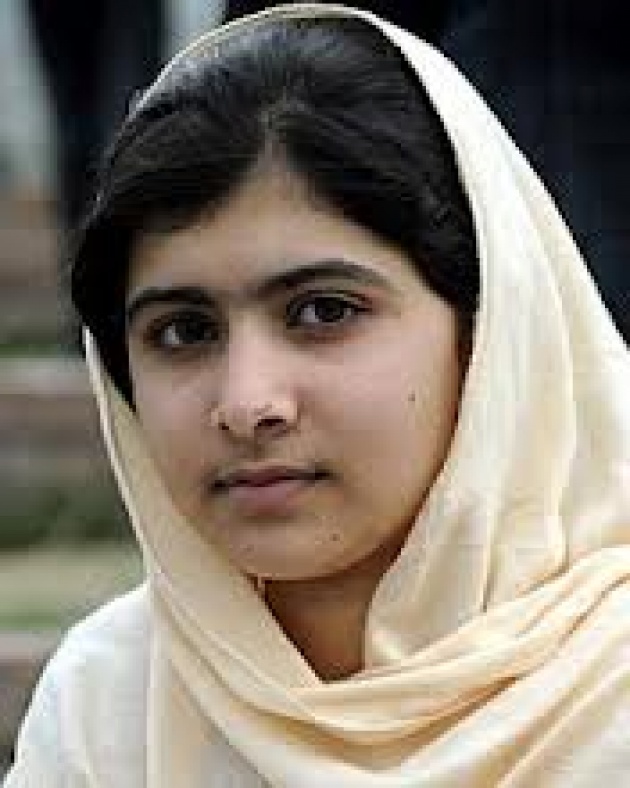پشت هر تاریکی روشنایی است. امید، شهامت و اعتقاد میتواند ما را به بهترین ها برساند
Reading about Malala Yousafzai, a school student and education activist from Pakistan and the story about her courage to raise her voice against Taliban that prevent girls from continuing their education and going to school is not forgettable. On 9 October 2012, Malala was shot in the head by Taliban when she was returning home by school bus with her friends. She was transformed to a hospital in Birmingham, England for a better rehabilitation, considering all the problems and difficulties she have faced during her education, she said to her friend that :" I understand that what happened was tragic, but you need to stay strong,” Malala told Ayesha. “You cannot give up. As Aryn Baker Middle East Bureau Chief for TIME, mentioned in her article.

There is not only one Malala, there are thousands girls like her around the world who fight for their rights for providing a better educational system for other girls in their country. School girls both in Afghanistan and Pakistan always face with anti-education issues which is supported by Taliban or other extreme parties.
I think building only a physical place with providing pencils, pens and notebooks to students is not enough or it is not the only way to provide a good education for students. In one hand you have Education which includes all the physical equipments and tools but in another hand you have training which acts like the spirit which gives a direction to that materials and thats Internet, Educational softwares and social media curriculum. These elements together will help school kids to not only access to a better education but even improve their communication skills and build their character even as a thought leader in their community.
Last week I interviewed with Lauren Lovelace the Executive Director of the U.S.-Afghan Women’s Council at Georgetown University. We had a nice conversation about situation of women in developing countries specially in Afghanistan, Central and South Asia, the whole topic went around women empowerment, awareness and the important one, Eduction.
Referring to this Afghan proverb: "Poshte har tarkiki Roshanaii ast", which means: "After every darkness is light", and its English proverb is : "There is a light at the end of the tunnel" bad time will always pass, as Afghans experienced a very dark decades by Taliban regime but the next decade things becomes better.
ملالی یوسفزی، دختر محصل پاکستانی هست که به خاطر فعالیت های اجتماعی خویش به منظور فراهم سازی محیط آموزشی بهتر و رساندن صدای دختران محصل به آن طرف مرزهای پاکستان، از طرف طالبان مورد حمله قرار گرفت. این تنها نمونه از خشونت های متعدد علیه زنان نمیباشد. در افغانستان و پاکستان هزاران ملالی وجود دارند که به خاطر دستیابی به آموزش بهتر صدا را در گلویشان خفه میسازند. گرچه افغانستان پس از سپری نمودن یک دهه پر تلاطم و تاریک در زمان طالبان، امروز مانند طفل نو پایی است که راه رفتن را آموخته است و اولین گام های خویش را به سوی آینده ای بهتر بر میدارد. در بالا شما گفتگوی من با خانم لارا لاولیس، مدیر اجرایی در بخش زنان افغان و آمریکای در دانشگاه جورج تون را میتوانید دنبال کنید. محور اصلی این بحث در واقع آگاهی زنان از حقوق شان و رسیدن به آموزش بهتر میباشد.
به نظر من تنها ساختن مدارس به صورت فیزیکی و در اختیار گذاشتن کتاب، دفتر و قلم کافی نیست. تحصیلات دارای دو جنبه میباشد یکی آموزش و دیگری پرورش که آموزش با میتوان همان منابع فیزیکی نامید و پرورش میتواند مثل روح برای یک بدن باشد. در پرورش ما میتوانیم جنبه های دیگری همچون فراهم سازی امکانات اینترنتی، دسترسی به نرم افزارهای آموزشی ، محتوای درسی مناسب را در نظر گرفت که نه تنها از طریق آن میتوان جنبه های مهارتی را بالا برد بلکه میتوان از طریق دسترسی به شبکه های آموزشی با دیگران ارتباط برقرار کرد و به تدریج محدوده ارتباطات خود را گسترش داد و صدای خود را به گوش جهانیان رساند.
درپایان میخواهم این بلاگ را با یک ضرت المثل به پایان برسانم که میگوید: پشت هر تاریکی روشنایی است. امید، شهامت و اعتقاد میتواند ما را به بهترین ها برساند



